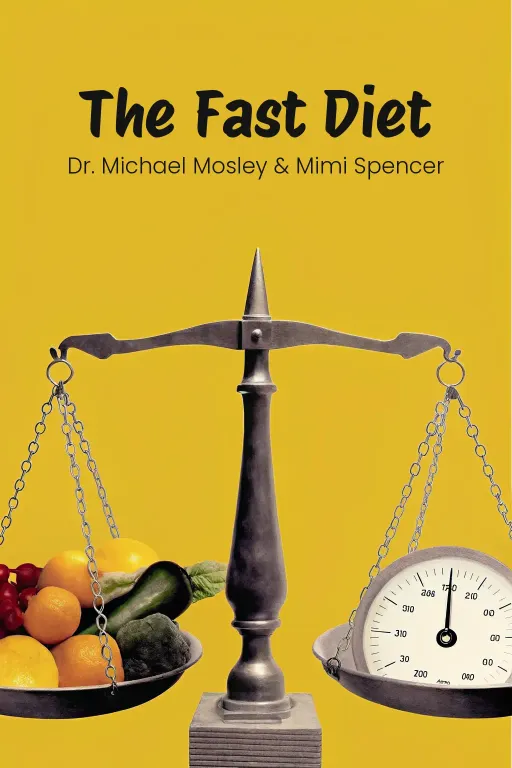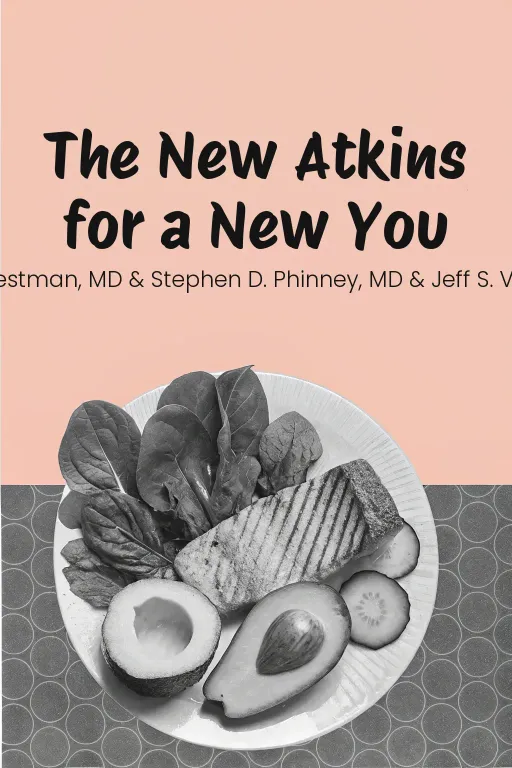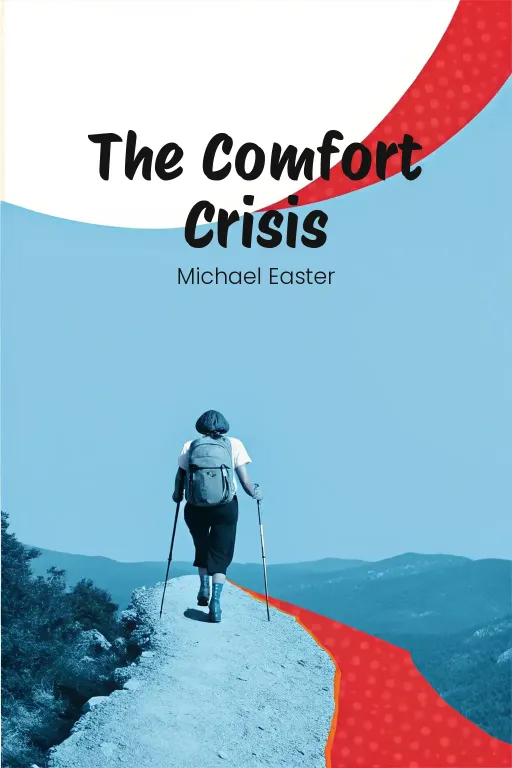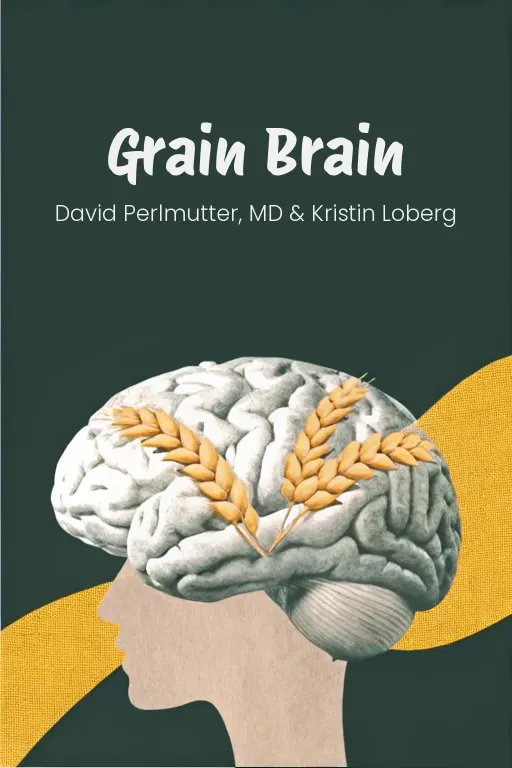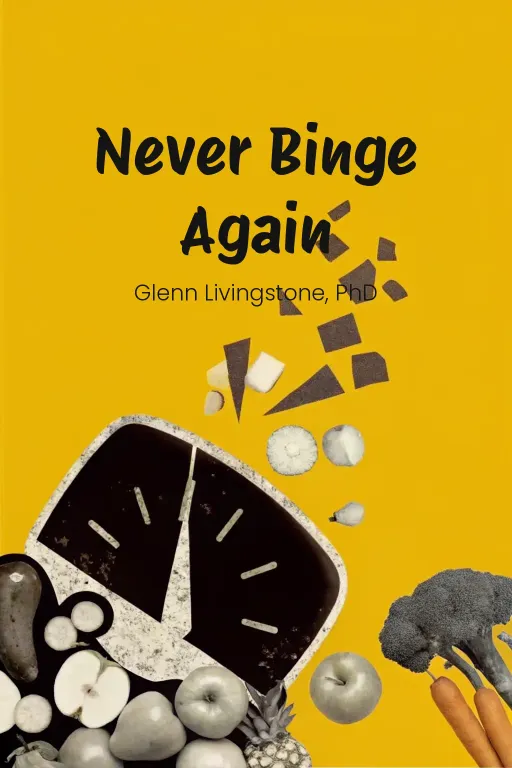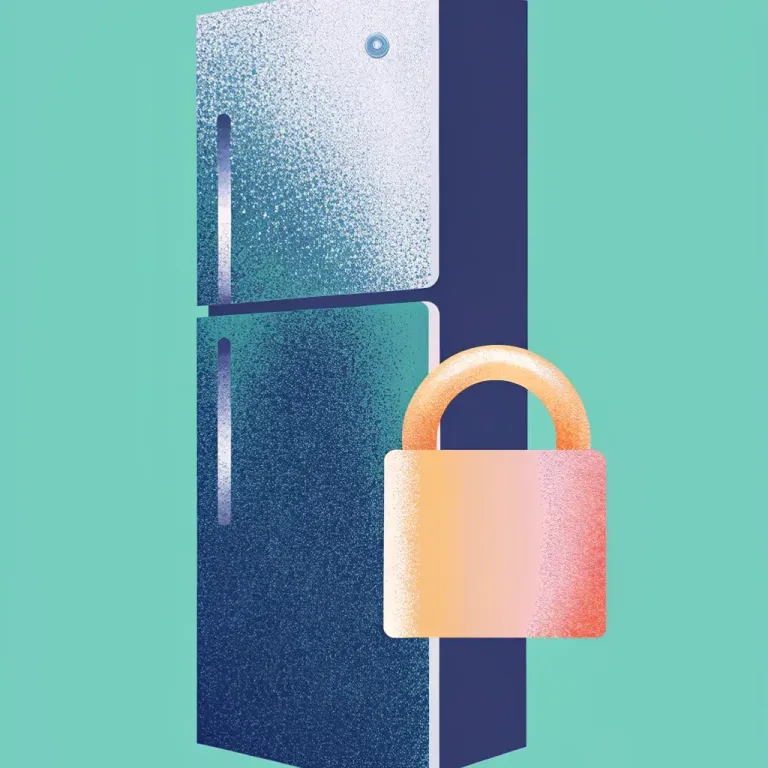
Crush Cravings: Control Your "Pig"!
Podcast by Beta You with Alex and Michelle
Reprogram Yourself to Think Like a Permanently Thin Person. Stop Overeating and Binge Eating and Stick to the Food Plan of Your Choice!
Crush Cravings: Control Your "Pig"!
Part 1
Alex: Hey everyone, welcome back! Think about the last time you told yourself, "Okay, this is the last cookie," or "No more chips," only to find yourself completely failing. What if that voice pushing you to grab just one more isn’t really you? Michelle: Oh, here we go, Alex. So, we're blaming our snack cravings on imaginary voices now? What is it this time—some evil cupcake conspiracy? Alex: Not exactly, Michelle. Today, we're diving into Never Binge Again by Dr. Glenn Livingston. This book “really” makes you rethink how we deal with cravings and binge eating. The core idea is actually pretty simple: that voice in your head—the one saying "just one bite won't hurt"—isn't really you. It's something Livingston calls the "Pig." The book provides some useful tools to help you take control, quiet that Pig, and finally say "no" without all the guilt. Michelle: "Pig"...right. Subtle. But seriously, does this actually work? I'm guessing it's more than just name-calling and crossing your fingers? Alex: Definitely. There are three core strategies the book focuses on, which we’ll explore today. First, we need to actually identify this "Pig," learn to recognize those unhelpful thoughts. Second, we’ll create a personalized Food Plan—think of it as a cage—keeping the Pig under control without just relying on willpower, which never seems to work, right? And finally, we’ll talk about how slip-ups can actually make you stronger instead of completely derailing you. Michelle: So, it's like training your brain to be a food ninja—you dodge temptations, set clear limits, and bounce back even stronger if you mess up. Okay, I'll admit, that sounds way more helpful than just feeling awful about yourself after polishing off a whole tub of ice cream. Alex: Exactly! It's not just about cutting back on snacks, it's about regaining control. What if we could actually break free from those cravings that manipulate us all the time? It would mean building a healthier, more balanced relationship with food. Alright, let’s dig in and see what we got!
Understanding the 'Pig' and Cravings
Part 2
Alex: Okay, Michelle, so you’re wondering about the long game—what happens when the “Pig” mounts a comeback? You’re right, nobody’s immune to setbacks. Michelle: Exactly! Life isn't a straight line, it’s more like a rollercoaster designed by a sadist. So how do you handle those inevitable dips? Alex: Well, Dr. Livingston emphasizes that relapses are learning opportunities, not failures. The key is consistent self-awareness. He advocates viewing each slip-up as data. Michelle: Data, huh? So instead of wallowing in self-pity after demolishing a pizza, you dissect what triggered it? Alex: Precisely. The book encourages asking yourself questions like: "What was I feeling right before the craving hit?" "What specific 'Pig Squeals' did I hear?" "What could I have done differently?" The answers help you reinforce your mental defenses for the next round. Michelle: Okay, so it’s like a post-mortem for your willpower. Understand the weakness, shore up the defenses, and get back in the game. Alex: Exactly. And another key strategy is what Livingston calls "future pacing." It’s about vividly imagining yourself successfully navigating challenging situations before they happen. Michelle: Like mental rehearsals? Visualizing yourself saying no to temptation before you’re even in the room with it? Alex: That’s the idea. By pre-experiencing your positive response, you strengthen the neural pathways that support that behavior. It makes the desired action feel more natural when the real test comes. Michelle: Huh. So it’s like pre-loading your mental software with the right responses… I can see how that'd reduce the reaction time when "Pig" shows up. Alex: Exactly! Instead of scrambling to find willpower in the moment, you’ve already laid the groundwork for success. Michelle: Alright, paint me a picture. How does someone future-pace their way out of a craving crisis? Alex: Let’s say you know you always struggle with snacking while watching TV at night. You could visualize yourself feeling that familiar urge for chips or cookies. But instead of giving in, you see yourself reaching for a glass of water, doing a quick stretch, or starting a chapter in a book. Michelle: And the more vividly you imagine it, the more likely you are to follow through? Alex: That’s the theory! You're essentially creating a mental template for your desired behavior so that when the moment arrives, you're more prepared to act on it. Michelle: Right, so the “Pig” charges, but you’ve already mentally rehearsed your ninja moves… I’m starting to see how this could make a real difference. Alex: Absolutely. And remember, lasting change isn’t about perfection—it’s about progress, a conscious effort to disrupt old patterns and build healthier ones. Michelle: Okay, I’m intrigued. But let’s get practical. How would someone apply this to modern urban life?
Creating and Adhering to a Food Plan
Part 3
Alex: That's a valid point, Michelle. Once we've identified the "Pig," the next step is really establishing a structured approach to combat those cravings. And that's where the Food Plan comes in. It's not just about resisting cravings with willpower—it's about setting up a system of clear rules. Almost like a framework for your eating habits, so you know exactly where you stand and what to do when the "Pig" tries to squeal its way back into control. Michelle: A Food Plan, huh? Sounds very… strategic. But isn't "planning" just a fancy way of overcomplicating things? Why not just say, “Eat healthy, avoid junk”? Alex: Well, because that’s way too vague, Michelle! Remember, the "Pig" thrives in ambiguity. If you’re unclear about what you allow yourself to eat, well, it creates loopholes, and that's where cravings sneak in. The Food Plan eliminates that gray area. It creates three categories: "NEVERS," "ALWAYS," and "CONDITIONALS." And each category is customized to fit your specific goals and, let's say, emotional triggers. Michelle: Alright, break it down for me. What are these three categories? Alex: Okay, starting with "NEVERS"—this is where you identify foods, behaviors, or even situations that trigger you to binge. It’s a clear, hard 'no,' with, you know, no exceptions. So, for instance, someone like Kevin from the book might put chips or sugary sodas into his "NEVERS" category. Michelle: So it’s the danger zone—the things you absolutely stay away from because they push you off the rails. Got it. Alex: Exactly! Then we have the "ALWAYS" category, which outlines habits or foods you commit to consistently, like drinking water before meals or including a serving of vegetables at dinner. These are positive actions that set the tone for, you know, healthy, sustainable patterns. Michelle: Makes sense so far; you're building a foundation. But what about the "CONDITIONALS"? That sounds suspiciously flexible. Isn't that just opening the door to cheat days? Alex: Not at all. "CONDITIONALS" are pre-set allowances for occasions where you want, let's say, balance but still maintain control. For example, someone might allow themselves a dessert only on birthdays or a glass of wine on Friday evenings with dinner. The key is that these allowances must be determined in advance, so the decision doesn’t happen in a moment of craving. Michelle: Hmm, so no spontaneous, "Oh, I’ll just treat myself today" situations. You’re essentially giving yourself permission under very specific rules. Alex: Right, and the beauty of it is that it removes guilt while maintaining structure. You know the terms, so there’s no rationalizing in the heat of the moment. Michelle: Alright, I'll admit, that sounds solid. But what about real-life scenarios? What happens when your perfectly crafted Food Plan bumps into the chaos of daily life—say, parties, work stress, or family gatherings? Alex: Well, that’s where the principle of 100% adherence comes in. When you fully commit to your Food Plan, you eliminate negotiation with yourself. Remember Kevin’s story? He struggled with late-night snacking while studying. Chips and soda were part of his routine, and it was sabotaging his focus and energy. By categorizing those snacks as "NEVERS" and shifting his environment to prioritize healthier options—like herbal tea and nuts in the "ALWAYS" category—he created a pattern that no longer relied on willpower. It was just automatic. Michelle: I see. So Kevin didn’t just white-knuckle through the craving; he designed his environment to make sticking to his Food Plan almost effortless. Alex: Exactly. And the more he adhered to the plan, the less appealing the "Pig Squeals" became. Michelle: Alright, but let’s push this further. Say you're at a party… buffet setup, desserts galore. What happens when the Pig starts whispering sweet nothings about those brownies? Alex: Great example. That’s where the "CONDITIONALS" come in. Let’s say Sarah, another case in the book, initially put desserts in her "NEVERS" category. But she realized that created tension during family dinners, where desserts often represented connection and tradition. Her solution? She allowed herself one small portion of dessert only at family gatherings—a condition that, you know, maintained her overall boundaries but made exceptions for what truly mattered. Michelle: So she adjusted her plan thoughtfully—not because she caved under pressure, but to align it with her values. That sounds like balance without losing control. Alex: Exactly! Flexibility isn't about abandoning the rules; it's about adapting based on reflection and making sure it's sustainable. Michelle: Alright, smarty-pants, I'll give you that. But do people really stick to these Food Plans perfectly? What happens if—scratch that—when someone slips? Alex: A fair question, Michelle, and no one's perfect. But the book emphasizes that a slip-up isn’t a failure; it’s just data. If you veer off your Food Plan, the key is to analyze what led to the moment. Was it emotional stress? Lack of preparation? Social pressure? You use that insight to strengthen your strategy for future encounters. Michelle: Huh, so a misstep isn’t a sign to give up; it’s more like a feedback loop to re-fine your approach. Alex: That’s right. And tools like journaling and visualization can play a big part in this. For example, by tracking your adherence to the Food Plan or mentally rehearsing how you’ll respond to tricky situations, you build your resilience over time. Michelle: I like it. You’re training your mind to view challenges as part of the process, instead of roadblocks. Alright, what’s the takeaway here? Alex: The takeaway is that a Food Plan isn’t just a diet; it’s a roadmap for reclaiming agency over your choices. By categorizing foods and behaviors into "NEVERS," "ALWAYS," and "CONDITIONALS," you gain crystal-clear boundaries that make the "Pig's" manipulation, well, almost irrelevant. Michelle: And if the Pig squeals, you remind yourself that you wrote the rules. It’s not a question of “Will I eat this?” It’s “I don’t eat this.” Alex: Exactly. The clarity of a Food Plan doesn't just simplify decisions; it creates a sense of empowerment, turning diet struggles into opportunities to strengthen your resolve.
Overcoming Challenges and Sustaining Empowerment
Part 4
Alex: So, with a solid Food Plan in place, Michelle, the real work begins – managing the inevitable challenges and staying on track long-term. This is where things get interesting. It's not just about following rules, it's about dealing with real-world complexities and staying empowered. Today, we're going to look at how to handle setbacks, manage that awful binge anxiety, reframe guilt as a learning experience, and use tools like journaling to adapt and “really” thrive. It's a holistic thing, resilience tying everything together. Michelle: Okay, so this is where the theory meets reality, right? You’ve got your perfect Food Plan, you've, for the moment, shut up the Pig. And then, bam! Life throws you curveballs - stress, parties, late-night cravings and so on. How do you stay consistent when it feels like everything is sabotaging you? Alex: Exactly. And the book is very realistic about this – it acknowledges that setbacks will happen. But instead of seeing them as failures, it reframes them as opportunities for growth. Take Amanda, for example. She's a marketing professional who used work stress as an excuse for constant takeout binges. Michelle: Ah, the classic "deadline diet" of pure junk food. Let me guess – she felt guilty afterwards and tried to just strong-arm herself into stopping? Alex: That's exactly how it started. But then she changed her approach. Through journaling, Amanda realized her binges were triggered by two main things: skipping lunch and looming deadlines causing stress. So instead of wallowing in self-blame, she looked at what she could actually change. She tweaked her Food Plan to include small, balanced meals, like grains and protein-rich snacks throughout the day, things she categorized as "ALWAYS". More importantly, she built in rituals for de-stressing after work, like listening to music and taking walks. Michelle: So, not just battling cravings head-on but also proactively addressing the things that made her vulnerable to them in the first place. Clever. I bet this not only stopped the binges but also lowered her stress, right? Alex: Absolutely! And that's the point – your Food Plan should evolve with you. Amanda's changes didn't just target the symptoms; they addressed the root causes. It's a great example of using setbacks to refine your strategy, not to give up entirely. Michelle: Alright, but how about the emotional baggage? Let’s be honest, after a binge, people don't just feel physically awful; they feel guilty and ashamed. How does the book suggest we deal with those feelings? Alex: That's a key point. Dr. Livingston emphasizes the difference between guilt and shame. Guilt arises when your actions violate your values – it's a signal to correct course. Shame, on the other hand, is a general feeling of worthlessness, and that can trap you in a cycle of despair. The goal is to use guilt constructively while rejecting shame completely. Michelle: Like a bad performance review – it stings, but ultimately, it's useful if it helps you improve. So, how do you prevent guilt from turning into shame? Alex: Journaling is a “really” powerful tool here. Consider Michael, a college student. He felt terrible guilt after bingeing at a late-night event. Initially, he let that guilt consume him, spiraling into thoughts like "Why do I always mess up?" But the next morning, he journaled about the whole sequence of events. He realized he'd skipped meals all day, leaving him ravenous, and once he started eating, it was hard to stop. Michelle: So, his binge wasn't a character flaw, but a logistical error. What did he do differently going forward? Alex: He adjusted his Food Plan. Now, before social events, Michael makes sure he eats balanced meals and drinks water, so he doesn’t show up starving or dehydrated. He also reviews his "NEVERS" list beforehand to reinforce his boundaries. This incident, which could have been another failure, actually became a catalyst for positive change. Michelle: Okay, so reframing guilt as a lesson learned instead of a life sentence. I can get on board with that. But what about people who don't just deal with guilt, they also have to deal with anxiety of bingeing again? Alex: Binge anxiety is tricky. But, the book offers some great strategies. It points out that this anxiety is usually fueled by the Pig, feeding you thoughts like, "You've failed before, you'll fail again," or "You're always one slip-up away from disaster." Recognizing these thoughts as "Pig Squeals" helps you separate from them emotionally. Michelle: Okay, but recognizing fear is step one. How about actually tackling it? How do you shut the Pig up when it starts squealing? Alex: Take Ryan, for example. He constantly worried about relapsing, especially during stressful periods. Through journaling, he realized this fear was the Pig amplifying his self-doubt. So he developed a mantra: "I've learned from past binges, and I have the tools to succeed." By repeating this whenever anxiety surfaced, he shifted his focus to his progress instead of "what-ifs." Over time, his anxiety lessened, and his confidence grew. Michelle: I like that – a mantra, simple, actionable, and a way to interrupt the Pig. Here’s another question. What about the custom of counting days since you last binged? I mean, people love milestones, but doesn't that also put extra pressure on them? Alex: That's a “really” insightful question. The book actually cautions against the "Time Counting Trap." While celebrating progress is great, obsessing over "X days since my last binge" can keep you psychologically tethered to old patterns. It creates pressure and makes a relapse feel like starting over, rather than just a minor setback. Instead, the focus should be on making good choices in the present. Michelle: So, don't look back, don't look forward, just focus on the meal in front of you. Another mindfulness strategy, I see. Alex: Exactly. Seeing recovery as a series of present choices builds resilience without the pressure of perfectionism. Think of it this way, success isn’t about how many days you avoid a binge, but how consistently you make choices that align with your Food Plan. Michelle: Right, Alex, this is all making sense. It's not just about the food; it's about your mindset. The Food Plan, journaling, reframing guilt, managing anxiety – they all build a foundation for personal growth. So, what's the bottom line here? Alex: The bottom line is sustainable empowerment. Every time you grapple with the Pig, analyze a setback, or even reflect on your experiences in a journal, you're reinforcing your control. It's about transforming food struggles into broader life skills – resilience, self-awareness, and discipline – that impact every part of who you are.
Conclusion
Part 5
Alex: So, to sum up, “Never Binge Again” is really more than just a diet book, right? It's a practical set of strategies for taking back control of your choices, period. By identifying that inner "Pig"—that voice of destructive cravings—and creating a clear Food Plan with your "NEVERS," "ALWAYS," and "CONDITIONALS," and employing tactics like journaling, and reframing any guilt, you get clarity and confidence to make choices that reflect your true values. Michelle: Right, and it’s crucial to remember that slip-ups aren't the end of the world; they're chances to learn something and adjust. Each time that Pig starts squealing, you have a choice: listen to the chaos it's peddling, or stick to the boundaries you've defined for yourself. It's not about being perfect, it's about making progress and developing resilience, one meal at a time. Alex: Precisely. So, for anyone ready to silence those "Pig Squeals" and become the master of their eating habits, this book provides a really effective structure to achieve that. It's not always a walk in the park, but the transformation can be profound—and ultimately, it goes beyond what you eat. It's about the person you become when you take charge of your decisions. Michelle: Okay, listeners, let's get practical. Your assignment is this: This week, really pay attention to your own "Pig Squeals." Start small—just notice them, name them, and see how your view changes. You might be shocked at how much influence you gain simply by recognizing that little voice. Alex: That's a fantastic starting point, Michelle. Small steps can lead to remarkable transformations. Thanks for joining us everyone, and we'll catch you next time! Michelle: And always remember, you're stronger than the Pig. Cheers!

